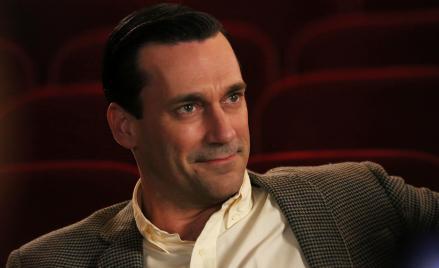Paul, Hanna,
I was pretty certain the MLK assassination would happen this season. I might have predicted it would occasion an episode about race. Instead, the show went small: A national tragedy became a platform for characters to ponder domestic themes. They turned inward to huddle with kin, fret over family.
Pete Campbell wants to go home when he hears the news, or he wants to utilize the news to strong-arm Trudy into taking him back. But Trudy won’t have it. And so Pete is driven to weirdly declare that the important thing to consider here is the fact that Dr. King had four children.
Ginsberg hears the radio report while out on a date. And then flees home—though it seems he might soon ditch the odd-couple routine he’s been trapped in with his father. I think the love of a good woman might well soothe Ginsberg’s neuroses. And tidy up his wardrobe. Not the suavest first-date moves from the kid, but sometimes a fellow can evince so little game that it somehow turns into a weird form of game. (Meanwhile, this schoolteacher is fetching times four, and I am firmly in favor of her taking Ginsberg’s virginity.)
For Peggy, an attempt to purchase a house (her agent’s theory: when there’s blood on the streets, buy property) is paired with consternation over what kind of home it might be. When Abe abandons her to cover potential riots in Harlem, Peggy is left standing alone in the lobby of the Ad Club awards show—looking on enviously as Megan is comforted by Don. Later, she fears Abe’s checked out of the home-buying process entirely. But it turns out Abe not only cares, he has very specific requests: No to the UES. Yes to the UWS. Diverse neighborhood, please. And—putting a dazzle in Peggy’s eyes—Abe would like to have kids! I’ve never seen Peggy happier. I am eager to follow her quest to have it all (mom, breadwinner, supporter of starving journalist) as well as her real estate hunt. She’s already missed on a 2BR/1.5BA on York with outdoor space for under $30K. I’m seeing a brownstone in her future.
At the Francis abode, Henry is disenchanted with Mayor Lindsay and ready to strike out on his own as a state senator. Meanwhile, Betty is again bringing the dramz. Her response to a political assassination is to try on cute dresses and nurture her husband’s urge to up his public profile. When Bobby picks at his bedroom wallpaper, she launches into a “Why are you destroying this house?” rant. It can’t be easy for Bobby. People are burning down buildings all over the country, yet he’s the one accused of property destruction.
I’ve sensed brewing Mad Men backlash this season. Some whine that the plots are slow. Some argue that the advancing era doesn’t lend itself as well to stylish art direction. But the most common complaint I’ve heard is that Don Draper has failed to progress as a character and is congealing into a grim, awful man. I actually find that a fascinating development—I’m impressed by a show that, steadily over the course of several seasons, manages to turn a sexy pop culture heartthrob into a figure both reviled and pitied. And in this episode, I felt, we saw Don evolve in unexpected ways.
First, there was the remarkable, Philip Larkin-esque soliloquy in which Don alludes to his horrific childhood and, thanks to a double dose of Planet of the Apes (a movie which hinted at concerns over the kind of world 1960s adults would be handing to their kids), discovers that he actually loves his own son. Don’s feeling pretty good about himself—in a narcissistic way. Then he realizes the father figure in his boy’s life is in fact Henry Francis, a man who may not be important enough to get shot but sure is important to Bobby. We close on some Batman-level brooding, Don on his balcony in the dark night, sirens wailing. Thank goodness “Cat’s in the Cradle” wasn’t released until 1974, or I fear it might have been our fadeout tune.
How do you two rate the handling of this major historical event we’d been anticipating? Still seemed to treat race rather obliquely. I thought it was interesting that Joan—so socially adept in the past—was given that cringemaking, white guilt moment in which she hugs Dawn, unsolicited.
And what was going on with the tweaked-out insurance guy? At first, I thought Ethan from Lost had shown up to make more cryptic pronouncements. But it seems even insurance guys are getting groovy these days, questioning the whole property thing, man.
You maniacs, you blew it up,
Seth
